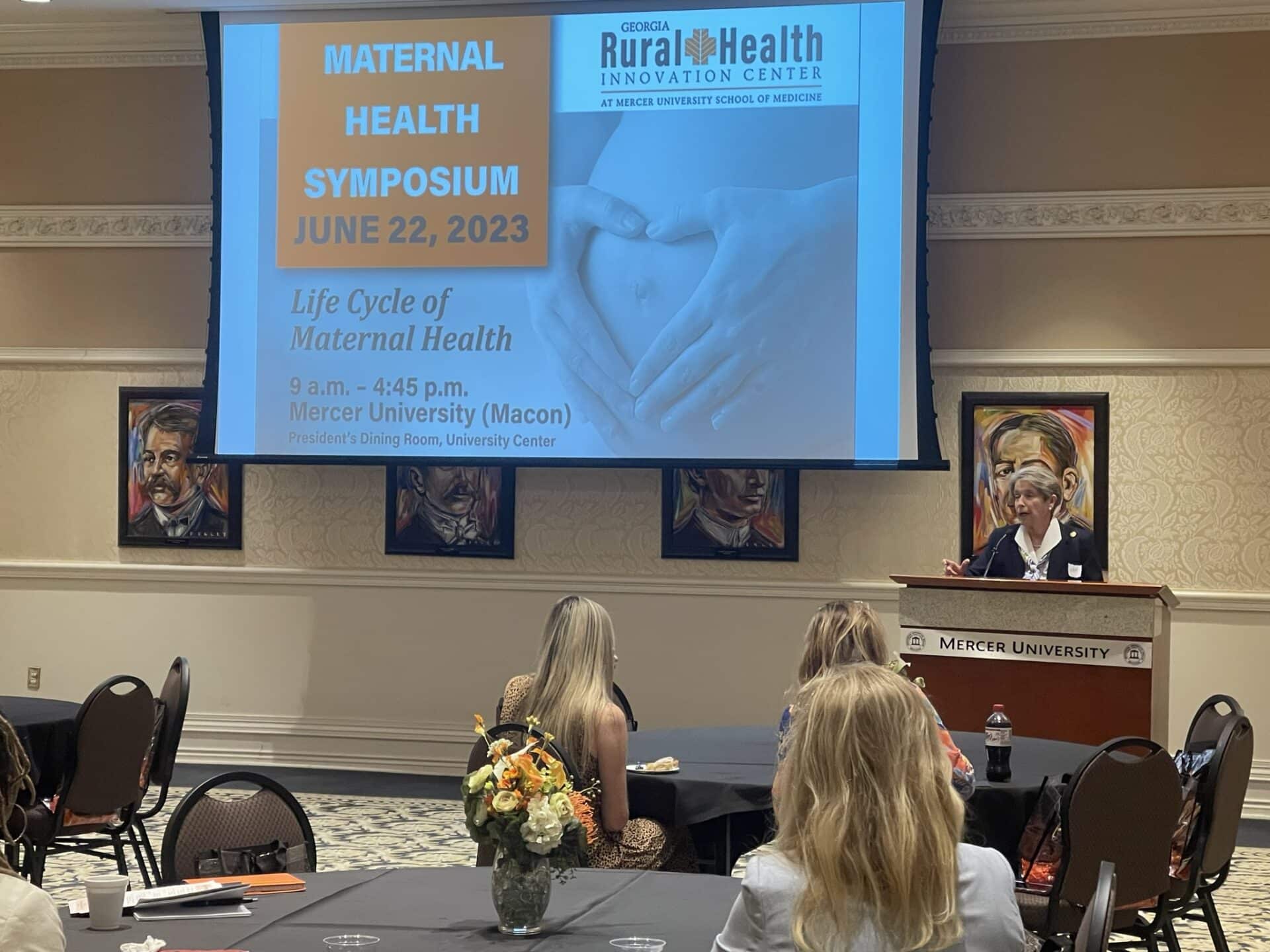
Center Hosts Second-Annual Maternal Health Symposium
The Georgia Rural Health Innovation Center (GRHIC) hosted its second-annual Maternal Health Symposium on June 22, 2203. GRHIC welcomed nearly 90 physicians, medical students, registered nurses, nurse practitioners, and other health care professionals to this training event to learn more about health disparities affecting maternal health.
This year’s symposium theme was the Life Cycle of Maternal Health, which focused on how optimum health during all aspects of life’s stages is crucial to positive outcomes: from birth to adolescence, teen years to adulthood, pregnant mothers to senior adults. Seven speakers presented topics on children and adolescents, preconception, pregnancy and postpartum, and menopause.
Mercer University School of Medicine (MUSM) Dean Jean Sumner, MD, FACP, opened the event, commending health care professionals for their part in advancing care, especially in rural areas. “The best doctors in our state are out there seeing patients, and some of the nurses out there are just changing the world, and it’s incredible. It is going to take every one of us to make Georgia the healthiest state to have a baby.”
The first speaker of the day was Jennifer Tarbutton, MD, who presented “The Healthy Child.” A Sandersville pediatrician, Dr. Tarbutton shared what constitutes normal child development, the importance of both the environment around the child and their lived experiences, and offered guidance on how caregivers and health care providers can best support the developmental needs of the children in their care. Dr. Tarbutton’s office is part of the joint initiative with MUSM, Children’s Healthcare of Atlanta, and GRHIC, to expand pediatric care in rural areas.
Jennifer Holton, MD, a practicing child and adolescent psychiatrist, spoke about the “Healthy Adolescent” and taught participants about what it means to have adequate parental monitoring given the alarming national rates of mental health conditions among children and teens. Dr. Holton discussed the importance of supporting children through their struggles with mental health and wellness and highlighted how clinical presentations might look different between genders. Dr. Holton remarked on the importance of discussing and supporting sexual health for adolescent patients and that having open dialogue about safe-sex practices will help lay a foundation for future health pregnancy outcomes in adulthood.
Joy Baker, MD, FACOG, used her personal narrative to illustrate how women from past generations—like her grandmother, Lois—did not have the same access to contraception and technology for family planning. She spoke about preconception health intervention methods, how to improve outcomes of pregnancy, and presented a holistic framework that clinicians can use to help support their patients through pregnancy.
Afternoon sessions were led by MUSM faculty member Keisha Callins, MD, MPH, who spoke about the importance of a healthy pregnancy, especially in light of Georgia’s health disparities and poor maternal outcomes for women of color. Dr. Callins took the participants through the ideal care plan for pregnant patients during each trimester including psychological screening, anticipatory guidance, fetal testing, and discussion of birth plans. Her presentation concluded by reinforcing the idea that the care of the mother does not end with the delivery of the infant, but rather, clinicians need to reframe their care to include a “fourth trimester,” to ensure that both mother and baby are happy and healthy.
Sherry Farr, RN, BSN, and Kellie Mercer, BS, representatives from the Lamar County Health Department, talked about the Lamar County Family Connection Collaborative, which was created to directly combat the incidence of low-birth-weight deliveries that occur within their county. Their intervention program is aimed at ensuring that both infants and families are thriving through improving “promising practices,” case management, data collection, community education, and partnerships with the Women, Infants, and Children (WIC) program in their service area.
The symposium concluded with a final presentation by Stephanie Singleton, MD, FACOG, an OB/GYN at Mercer Medicine Putnam County, who spoke about menopause. Dr. Singleton provided an important update on the medical community’s improved understanding of caring for women during menopause and post-menopause. She reviewed with the audience an approach of caring for these patients, using shared current research and recommendations to help patients better navigate the symptoms and changes that occur as part of this normal reproductive aging process.
Participant feedback about the event was very positive with some commenting, “I liked that you broadly covered everything from preconception to menopause,” “I liked being part of an opportunity to get together with other health professionals in the state who are all committed to improving maternal and child health here within the state of Georgia,” and “I liked the energy of the day and that this symposium featured women coming together to take care of other women.”
